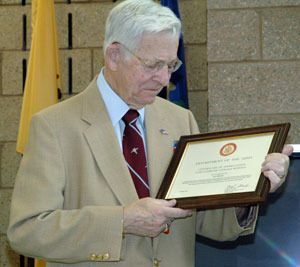MARYSVILLE — Leo Hymas was a 19-year-old infantryman in the U.S. Army when he took part in the liberation of the Nazi concentration camp Buchenwald on April 9, 1945.
Hymas’ voice still quavered 68 years later, on April 13 in the Marysville Armed Forces Reserve Center, as he told the tale of what he saw that day, as part of the 364th Expeditionary Sustainment Command’s observance of the Holocaust Day of Remembrance.
Before he had even reached Buchenwald, Hymas’ time in the service had been harrowing, as a small-town Idaho boy found himself drafted into World War II at the age of 18, in the years following the Japanese bombing of Pearl Harbor, during which he’d seen gas and meat rationed, and the production of new tires and new cars halted completely.
“My drill sergeant was the meanest man I’d ever met,” Hymas said. “I got so homesick. I missed my dad, my mom, my friends, even the cows on my farm. Unlike the guys I saw in uniform in my hometown, I didn’t even get to date a pretty girl, or an ugly one,” he added, drawing laughter from the crowd.
To maintain operational security, Hymas wasn’t allowed to inform his family of his whereabouts, and when he sent letters home censors routinely blacked out certain passages. He became one of 7,000 troops on a Navy ship heading to Europe with 3,500 bunks, in which so many people got seasick that the vomit was literally up to his ankles.
“You’d just slide back and forth on the floor, and that smell,” Hymas said. “I thought to myself, I don’t want to do this, I’m just a kid.”
As part of the 97th Infantry in Patton’s Third Army, Hymas was partnered with Jimmy DiMarco, a city boy from Boston whose accent initially chafed Hymas’ country-boy sensibilities, but they soon became close friends as they fought across Germany, until DiMarco caught a round and died in front of Hymas.
“He gave his life for me and all of you sitting here,” Hymas said. “If Hitler had won that war, he’d bragged that Nazis would walk the halls of Congress.”
Hymas’ resolve to defeat the Nazis was further strengthened when he saw a starving little girl on the streets, before he took part in the attack in Weimar, and all he could do was give her two pieces of chocolate. In Buchenwald itself, he smelled burning human flesh for the first time, a smell he couldn’t identify because he’d never smelled it before, just as he’d never imagined that concentration camps such as Buchenwald existed before he witnessed their horrors for himself.
“I saw stacks of naked, rotting bodies, and collections of skin that had been turned into lampshades,” Hymas said. “I cannot tell you the evil we found.”
Among Hymas’ discoveries were a host of SS officers who were changing into civilian clothes. For helping to capture 91 prisoners, he received the Bronze Star.
“We overcame the worst evil we have any record of, but your enemies are spiritual in nature,” Hymas told the military members in the audience. “Your enemies include racism, and intolerance of others just because they’re different, but they are a challenge that you will overcome.”
Before he received an Army Certificate of Appreciation for Patriotic Civilian Service, Hymas revealed that his uniform had finally gotten him a date with a pretty girl, and 65 years ago, he married her.







